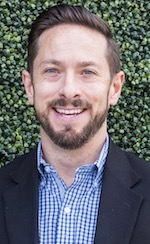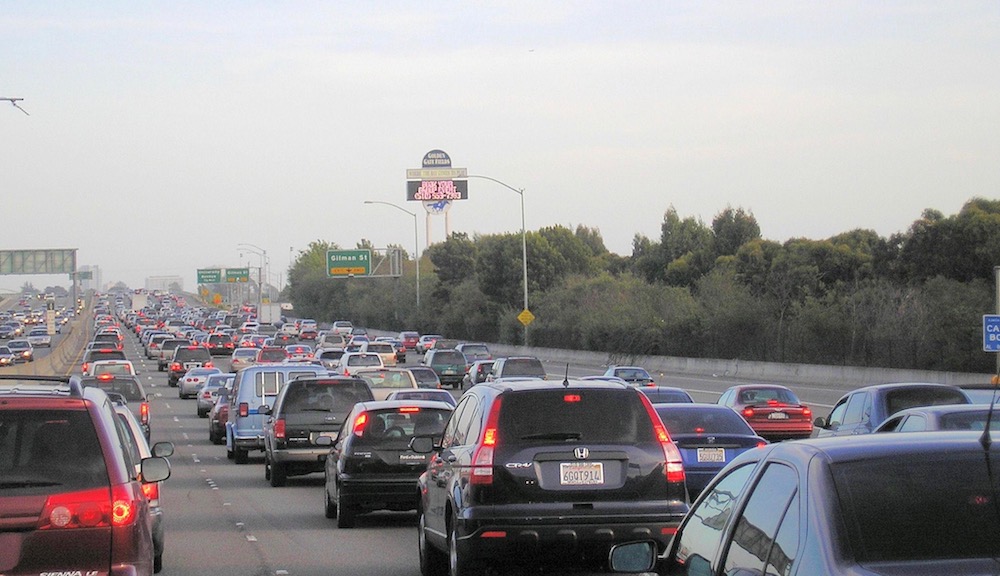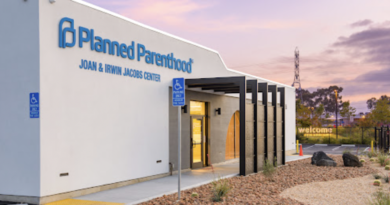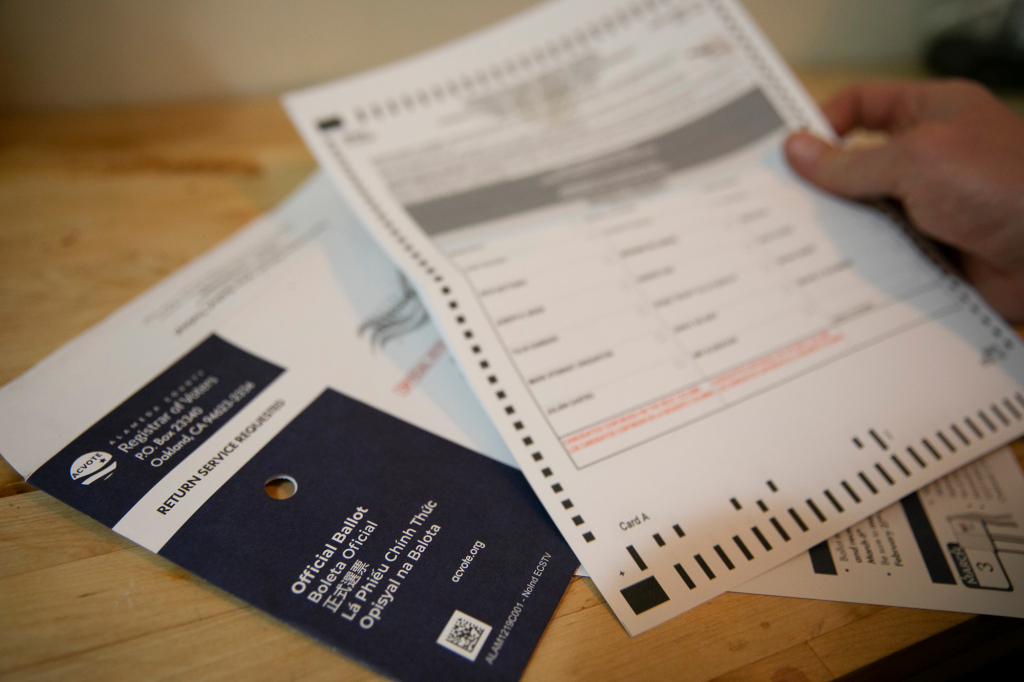Daily Business Report-Aug. 3, 2018
(Photo: mr_write at Morguefile.com)
How Trump’s new rules for cars
would hit California — if they survive in court
By Julie Cart | CALmatters
The Trump administration has released revamped rules that would unravel strict Obama-era standards for tailpipe emissions and gas mileage in new cars and trucks and directly challenge California’s authority to determine its own emissions limits.
The long-anticipated proposal offers a range of scenarios but singles out a preferred alternative: freezing fuel-efficiency standards in 2020 at an average 35 miles per gallon. It will almost certainly face a barrage of legal challenges, but any rollback would be a blow to California’s ambitions for limiting planet-warming greenhouse gases.
Reducing transportation emissions is a critical component of the state’s approach to climate change, a defining policy for California. Transportation accounts for nearly 40 percent of the state’s harmful air pollution, and existing state rules directly reduce tailpipe emissions, becoming more stringent over time.
As a practical matter, however, the proposed changes could languish in courts for years, allowing California to stay its course in the near term. State officials have vowed take aggressive legal action to prevent implementation of the new standards. California, along with dozens of other states, sued the administration in May, challenging the administration’s right to revisit the existing rules.
Gov. Jerry Brown, in a written statement Thursday, termed the proposed rollback a “reckless scheme” that would mean “motorists will pay more at the pump, get worse gas mileage and breathe dirtier air. California will fight this stupidity in every conceivable way possible.
The rules set at the end of the Obama administration require an average 45.4 miles per gallon by 2022 and more than 50 miles per gallon by 2025. Standards differ by vehicle type and are more stringent for cars than for SUVs and light trucks.
Trump administration officials said the revised rules would make cars more affordable and safer for consumers. “More realistic standards will promote a healthy economy by bringing newer, safer, cleaner and more fuel-efficient vehicles to U.S. roads,” Transportation Secretary Elaine L. Chao said in a statement.
The proposal, announced by the Environmental Protection Agency and the National Highway Traffic Safety Administration, are open to negotiation, and at least one federal official left the door open for compromise. EPA assistant administrator Bill Wehrum said, “We are committed to working with California to try to find a mutually agreeable set of regulations,” according to the Los Angeles Times.
The proposal will undergo 60 days of public comment before being finalized.
Of the many dozen skirmishes between Washington and Sacramento, the emissions revisions are among the most contentious, touching on one of the state’s most intractable problems: air pollution.
Mary Nichols, who chairs the state Air Resources Board, echoed Brown’s defiant tone.
“Stay tuned for further comment,” she said in a statement. “Meantime, California remains fully committed to a rigorous 50-state program with a full range of vehicle choices. That program is in effect right now and will remain so for the foreseeable future.”
Perhaps most troubling for state officials, the proposed rules take aim at California’s longstanding autonomy in protecting its air quality and public health. Congress, under the Clean Air Act, granted the state a unique right to forgo federal emissions standards and chart its own regulatory course.
That waiver has been a critical tool for California to scrub much of the smog from the L.A. basin and leverage for the state’s push to reduce transportation emissions. Losing the right to self-regulation takes away the consistency state regulators want to achieve and puts California at the mercy of each administration that could revisit the rules as it wishes.
More than a dozen other states have adopted California’s standards. Environmental groups and health organizations, such as the American Lung Association, say the proposed rules would return congested cities to the smoggy, unhealthful traps they once were.
“It would be a violation of our public health and air quality nationally,” Bill Magavern, a lawyer and policy director for the advocacy group Coalition for Clean Air. Most pollution in California “is coming from vehicles, so (existing) rules are essential to public health.”
Agencies and activists are still evaluating the implications of the proposal. But some legal experts say the entire package will be vigorously challenged in court.
“The federal government cannot take away permission that its already granted,” said Irene Gutierrez, an attorney with the environmental group Natural Resources Defense Council. “It would be completely contrary to how Congress set up the program for California, which was about the need to have its own regulatory powers to protect citizens of the state.”
Sean Donahue is a lawyer representing the Environmental Defense Fund, which, along with other environmental groups, sued the EPA in May, after then-chief administrator Scott Pruitt announced that Washington would revisit the emissions rules. Donahue called the EPA’s move “an extraordinary attack on California’s historic role….There’s going to be a huge fight.”
One argument he and others will make is that the federal agency has never revoked any of the more than 100 waivers it has granted to California since the 1960s. A court might consider such a pivot a “violent rupture with precedent,” Donahue said.
Another strategy, some experts say, is to question the administration’s rationale for a rules change. Pruitt maintained that existing regulations are onerous for industry, that smaller, more fuel-efficient cars are less safe and that consumers want to buy SUVs and trucks despite their higher gas consumption and more polluting emissions.
When the Obama administration adopted the current national standards in 2012, its decision was accompanied by thousands of pages of supporting data, research and testing results. Magavern predicted courts will want similar documentation for any new regulations.
Although auto makers signed on to the fuel standards, with Trump’s election they saw an opening to renegotiate terms, hoping to gain some grace time for conforming to the stricter rules. Some manufacturers now say they never advocated for the wholesale rollbacks Washington is proposing.
A group of automakers sounded a conciliatory note Thursday, calling for “substantive negotiations to begin.”
“We urge California and the federal government to find a common-sense solution,” the trade groups Auto Alliance and Global Automakers said in a statement.
CALmatters.org is a nonprofit, nonpartisan media venture explaining California policies and politics.
_____________________

UC San Diego awarded $11.3 million
from DARPA to improve chip design
UC San Diego will be awarded $11.3 million over four years from DARPA (Defense Advanced Research Projects Agency) to lead a multi-institution project that aims to develop electronic design automation tools for 24-hour, no-human-in-the-loop hardware layout generation.
Professor Andrew Kahng, who is on the faculty of both the computer science and electrical engineering departments, will lead the project, called OpenROAD. “For the U.S. to be the vanguard of innovation we need to fully leverage semiconductor technology,” Kahng said. “There’s an incredible delta between what’s possible with silicon versus what people are actually able to afford or bring themselves to risk attempting—we’re trying to narrow that gap.”
OpenROAD (Foundations and Realization of Open, Accessible Design), supports the Intelligent Design of Electronic Assets (IDEA) program within DARPA’s larger Electronics Resurgence Initiative (ERI). ERI is led by DARPA’s Microsystems Technology Office, and aims to address the impending engineering and economic challenges now confronting the advancement of microelectronics after 50 years of relentless progress.
_____________________
San Diego International Airport joins
suit against Port, angering South Bay leaders
Ashley McGlone | Voice of San Diego
The San Diego International Airport has kicked up a storm by joining a lawsuit challenging the legality of a rental car fee recently imposed by the Port of San Diego.
The Port reinstated the $3.50 fee in April to raise at least $5 million annually to pay for a new $40 million parking structure it wants to build on Chula Vista’s waterfront alongside a new convention center, hotel, and shopping and dining complex. The Port was recently sued by two rental car companies who allege the fee is actually an unlawful tax. The airport’s decision to join that lawsuit threatens to derail the entire bayfront project, port and other South Bay leaders say.
The move also appears to have reignited tensions with Assemblywoman Lorena Gonzalez, who abandoned efforts to consolidate the airport with the Port earlier this year. She tweeted Wednesday the airport’s participation in the litigation was a “slap in the face to my district” and pledged to “look at possible governance changes next year.”
___________________
University scholars’ research expands
access to care for seniors and caregivers
Results of six projects aimed at expanding access to care that enhances quality of life for seniors and caregivers will be reported at the California State University Institute for Palliative Care’s National Symposium for Academic Palliative Care Education and Research Oct. 11-12 at the San Diego Hyatt Regency Mission Bay Spa and Marina.
Researchers were awarded seed grants, funded by the Gary and Mary West Foundation, to carry out one-year projects to design and test approaches that will lead to improvements in care or quality of life for those suffering from chronic, serious, or life-threatening illnesses.
___________________
Gov. Brown signs tribal compacts
Gov. Jerry Brown has signed a tribal-state gaming compact between the State of California and the La Jolla Band of Luiseño Indians, as well as amendments to the current tribal-state gaming compacts with the Santa Ynez Band of Mission Indians, the Karuk Tribe and the Dry Creek Rancheria Band of Pomo Indians.
The compact with the La Jolla Band furthers the parties’ mutual interest in improving the quality of life of tribal members though a framework that generates revenue for governmental programs while also fairly regulating the gaming activities; affording meaningful consumer and employee protections; and mitigating the off-reservation impacts of the gaming facility.
The amendment to the 2015 compact with the Santa Ynez Band authorizes off-track wagering on horse races at a satellite wagering facility within the existing gaming facility. The amended compact with the Karuk Tribe conforms the provisions of its 2013 compact regarding workers’ compensation to those of more recent compacts. The amended compact with Dry Creek makes technical corrections to its 2017 compact to clarify and more effectively implement the prior agreement.
___________________
Stormwater quality improvements
at Del Mar Fairgrounds to begin
Significant infrastructure upgrades to improve water quality in San Dieguito Lagoon and Stevens Creek marine protected areas are scheduled to begin next week at the Del Mar Fairgrounds. Improvements include the capture of stormwater from areas of the Fairgrounds where animals are housed and treatment of that stormwater to appropriate levels before being discharged into adjacent waterways.
Key components of the estimated $10 million, two-year project with contractor Barnhart-Reese include: converting the Del Mar Racetrack infield water features into holding ponds for stormwater, constructing a wetlands area and building a treatment plant that will remove pollutants from stormwater before it leaves the Fairgrounds.
The project is the effort of the 22nd District Agricultural Association (a state of California agency that owns and operates the Del Mar Fairgrounds), in collaboration with the San Diego Regional Water Quality Control Board, to assure that the stormwater discharged from those areas of the Fairgrounds where animals are housed is in compliance with applicable clean water requirements.
___________________
San Diego to lose USS Carl Vinson but
gain another carrier: USS Abraham Lincoln
Times of San Diego
San Diego will lose the USS Carl Vinson aircraft carrier while gaining another Nimitz-class carrier, the USS Abraham Lincoln, the Navy announced Thursday. In a major switch of homeports, the Lincoln, currently in Norfolk, Va., will rejoin the Pacific Fleet, making San Diego its base.
Commissioned in 1989, the The Abraham Lincoln, previously served in the Pacific Fleet from 1990 to 2011 before moving to Norfolk for midlife refueling.
The other two carrier shifts are tied to carrier maintenance, said North Island Naval Air Station in Coronado.
The John C. Stennis, currently home-ported in Bremerton, Wash., will change homeports to Norfolk in advance of its midlife refueling, or reactor complex overhaul at Newport News Shipbuilding.
The Stennis was commissioned in 1995; Nimitz-class carriers are built to last 50 years.
The Carl Vinson will conduct a homeport change to Bremerton in advance of its docking-planned incremental availability at Puget Sound Naval Shipyard, the Navy said.
___________________
Personnel Announcements
Bradford Powell Joins Cubic Mission Solutions

Cubic Mission Solutions, business division of Cubic Corp., has appointed Bradford Powell as vice president and general manager of the command and control, intelligence, surveillance and reconnaissance (C2ISR) solutions business. In this role, reporting to CMS President Mike Twyman, Powell will be responsible for the continued and successful execution of the C2ISR business portfolio of programs and will also lead the development and execution of the C2ISR business growth strategy.
Prior to joining Cubic, Powell held a number of senior director positions at Northrop Grumman Mission Systems where he was most recently responsible for a portfolio of programs, including the Global Combat Support System – Army and the U.S. Postal Service Biohazard Detection System programs. He was previously based in Saudi Arabia for three years, leading a joint venture where he directed Northrop Grumman’s business execution and growth strategy for delivering critical infrastructure protection solutions to key middle eastern customers. Powell was also responsible for the successful pursuit and capture of multiple C4ISR franchise programs related to tactical airborne networking and senior leader communications.
___________________
Andrew Ladd joins Kona Kai Resort & Spa

Noble House Hotels& Resorts Ltd., a hotel ownership and management group, announced the appointment of Andrew Ladd as director of sales for Kona Kai Resort & Spa, the hotel group’s property located on Shelter Island. With more than 15 years of hospitality and sales experience, Ladd will leverage his knowledge and expertise to drive sales and boost visibility for the historic San Diego resort.
Before joining Kona Kai Resort & Spa, Ladd was director of sales and marketing for The Lafayette Hotel, Swim Club and Bungalows in San Diego where he led a team of six sales members and spearheaded a strategic initiative to revamp the hotel’s brand image via social media, website, and print.
Prior to The Lafayette Hotel, Ladd was the director of sales at Whitney Peak Hotel, an AAA 4-Diamond hotel in Reno, Nev. There, Ladd achieved over 300 percent in the yearly booking goal in corporate business travel for 2017.
Ladd also served as national sales manager at Hilton Garden Inn in Reno where he established over 20 new corporate business accounts in four months.



